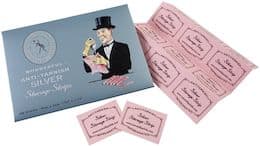
Curated with aloha by
Ted Mooney, P.E. RET

The authoritative public forum
for Metal Finishing 1989-2025

-----
What is difference between silver oxidation and corrosion
Q. Hi:
Who can tell me that what is really the difference between the silver (after the silver has been exposed in the air several months) oxidation and corrosion? Can you let me know if there is any silver plating (on aluminum) that can be done to prevent silver oxidation? In addition, what is really the life for the silver plating electronic housing which functions inside a room where the humudity is 5~90% and temperature is between +40C and -O C.
Best Regards,
GuoQing Fengtelecom mfgr. - Montreal, QC, Canada
2002
A. Iridite 18-P is a chromate conversion coating for silver that provides tarnish and oxidation protection. This product is available from Macdermid Waterbury CT. There may be other suppliers of chromates, but I am not aware of them. The film may be somewhat yellow, and offers good protection against tarnish and oxidation. The coating does not interfere with electrical contact.

Don Baudrand
Consultant - Poulsbo, Washington
(Don is co-author of "Plating on Plastics" [on Amazon or AbeBooks affil links]
and "Plating ABS Plastics" [on Amazon or eBay or AbeBooks affil links])
2002
A. The black or blueish color on the silver is not a oxide layer. When you are oxidizing silver you use f.ex. potassiumsulfide (K2S). The sulfide react with the silver and make a silversulfide layer - which is black/blueish... So it's not a really oxide layer, but a layer that is created throug an redox proces.
Hope it answer some of your question... :)
Thomas Hannibal- Denmark
2002
Q. I have also observed yellow-colored tarnish on Ag plating. What is this?
Paul Calo- Cebu, Philippines
September 6, 2009
Silver's Corrosion Protection Properties
Q. Hi there,
I'm looking into the corrosion resistance of different metal coatings. My frustration is that many websites seem to just slap a piece of text that says 'corrosion resistant' next to every process without really going into any sort of detail.
I'm curious about silver plating and its corrosion resistance properties compared to other plating and what exactly makes it better or worse. Any help is appreciated.
product buyer - Bradford, West Yorkshire, UK
October 20, 2016
A. Hi Oliver. It's easy to appreciate the frustration, but it's difficult to resolve it because "corrosion" is such a complex issue...
• Things that are corrosion resistant in one environment are not necessarily corrosion resistant in another. For example, zinc plating is the most popular metallic corrosion-proofing coating for steel components in typical ambient conditions, but it offers absolutely zero protection in acid situations. So, do we mean resistant to acids, alkalies, and other chemicals, or do we mean resistant to rain?
• Whether a metallic coating contributes to corrosion resistance depends what substrate you are putting it on. This is because some metals are sacrificially protective to others. One reason zinc is so popular, besides its cost, is that it sacrificially protects steel from corrosion even if pinholes exist in the coating -- just as a zinc anode protects a steel ship hull. But when silver is applied to steel the result is the opposite: if any pinholes exist, the silver forces the steel to sacrifice itself to protect the silver.
• Often it is not the metal which is corrosion resistant, but the corrosion products from the initial corrosion. Metals like aluminum and titanium are corroded extremely easily but the corrosion products tend to form a fairly tight and adherent coating that slows down any additional corrosion whereas the corrosion product of steel (rust) is powdery, non-adherent, absorbs water, and accelerates continuing corrosion instead of reducing it.
• Sometimes we disagree on what constitutes "acceptable" corrosion. Silver tends to not stay tarnish-free. Do you need a tarnish-free surface, or do you not care what it looks like?
When all this is taken into account, it's difficult to say if silver coating is corrosion resistant. In general, I'd say yes because silver plated flatware can last decades; but it will probably tarnish quickly. Good luck.
Regards,

Ted Mooney, P.E. RET
Striving to live Aloha
finishing.com - Pine Beach, New Jersey
October 2016
Q. Ah, some good points actually. I think that's where my confusion lies. Obviously I was aware that silver would tarnish, but I was curious how it stood up to abrasion and acid.
Oliver gwynne [returning]- Bradford, West Yorkshire, UK
October 20, 2016
A. In normal storage silver is very adept at reacting with sulfur in the air to tarnish through many colours depending on the atmosphere to grey black. Silver sulfide.
This can be removed by a number of solvents e.g. sodium sulfide, acidic Thiourea
⇦ this on
eBay
or
Amazon [affil links] , Al foil in alkaline conditions, rubbing polish, etc. Chromate dipping can resist this discolouration as can organic sulfur compositions as in various silver polish formulations such as Goddards who had patents but now run out.
Don't know if this what you're asking but please clarify

Geoffrey Whitelaw
- Port Melbourne, Australia
October 21, 2016
Q, A, or Comment on THIS thread -or- Start a NEW Thread
